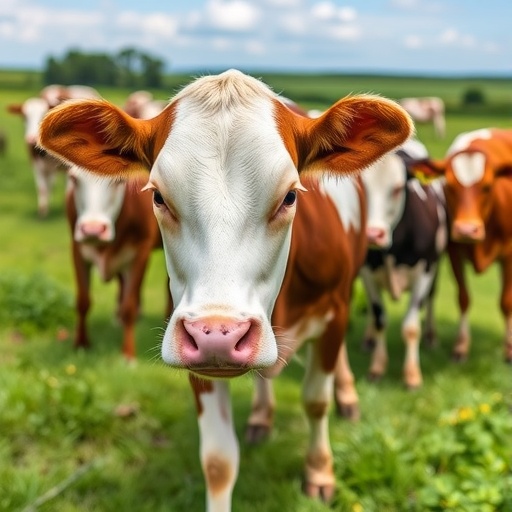In a groundbreaking study published in BMC Genomics, leading genetic researchers have embarked on a pioneering journey to unravel the complex genetic architecture associated with resilience in dairy cows. The research, conducted by a team including notable scientists such as F. Keßler, M. Zölch, and R. Wellman, has the potential to redefine the future of dairy farming by enhancing the genetic foundations of cattle. This innovative approach aims not only to boost the productivity of dairy cows but also to elevate their welfare, making them more adaptable to the changing challenges posed by climate change and disease.
The team conducted an extensive genome-wide association study (GWAS) that spans multiple breeds, a notable achievement that differentiates this research from traditional studies that typically focus on single breeds. By including a diverse range of dairy breeds, the researchers aimed to identify specific genetic loci linked to desirable traits such as disease resistance, heat tolerance, and overall fitness. Their comprehensive methodology harnesses advanced genomic technologies, ensuring a thorough analysis of the genetic variations present across different populations.
The significance of this research lies not only in its scientific insights but also in its practical implications for the dairy industry. With global dairy demands continually rising, the ability to genetically map resilience traits can lead to more robust dairy herds capable of thriving in less-than-ideal conditions. This means that farmers could eventually select traits that would not only increase milk yield but also ensure sustainable farming practices that align with environmental concerns.
An integral part of the study involved extensive field trials and phenotypic assessments, ensuring that the genetic data collected was not only comprehensive but also reflective of real-world conditions. The researchers collected extensive samples and data from various cattle farms, analyzing health records, milk production statistics, and environmental stress factors. This holistic approach provides a clearer understanding of how genetic factors interplay with external influences, underscoring the importance of resilience in today’s dairy farming.
Through their findings, the authors have empowered dairy producers to make informed breeding decisions that factor in genetic resilience. This shift towards data-driven decisions could lead to significant advancements in breeding programs, allowing farmers to select for traits that enhance animal welfare and dairy productivity. Additionally, it could address issues of animal health and longevity, ultimately resulting in more sustainable dairy farming practices.
The implications of improved resilience in dairy cows extend beyond the agricultural sector. By developing more resilient breeds, the industry can contribute to food security and economic stability in rural communities. As climate change continues to impact farming practices, the ability to breed cows that can adapt to more extreme weather conditions becomes increasingly critical. This research positions the dairy industry to confront these challenges head-on, ensuring that food supply chains remain intact even in times of crisis.
Furthermore, the study emphasizes the value of cross-breed genomic associations in livestock research. Traditionally, much of the genomic work in cattle has been confined to single breeds, potentially leaving out valuable genetic information contained within different genetic backgrounds. The researchers’ cross-breeding approach facilitates gene discovery that may lead to novel resilience traits previously overlooked. This offers dairy producers a broader genetic toolkit to ensure their herds can meet future challenges.
In terms of methodology, the team’s use of high-throughput sequencing and advanced bioinformatics tools represents a significant leap forward in the field. This blend of technology allows for rapid identification of genetic markers linked to specific traits, expediting the process of genetic selection in breeding programs. Such technological advancements are being hailed as a game-changer within agricultural genetics, promising to overhaul traditional breeding strategies.
The study also carries social implications for communities dependent on dairy farming. By prioritizing animal resilience, producers can reduce reliance on antibiotics and other veterinary interventions, leading to healthier cows and milk. As consumers become more conscious of where their food comes from, this focus on animal welfare aligns with growing market trends demanding transparency and sustainability in food production.
The pioneering nature of this research has garnered attention not only in the scientific community but also among stakeholders in the agricultural sector. Industry leaders recognize the need for enhanced genetic solutions as they grapple with the challenges posed by a changing environment and increasing consumer demands. By following the findings of this study, the dairy industry can forge a path toward greater sustainability and profitability.
In conclusion, Keßler, Zölch, and Wellman’s collaborative research marks a significant milestone in animal genetics and dairy science. Their exploration of resilience traits in dairy cows through cross-breed genome-wide association analysis promises to pave the way for future innovations. As the dairy sector prepares to navigate the complexities of modern agriculture, this research stands as a beacon of hope, illustrating the power of genetics to not only boost productivity but also promote welfare, sustainability, and resilience in the face of adversity. The journey does not end here; this study serves as a foundation upon which future research can build, advancing our understanding of genetic resilience and its vital role in dairy farming.
Subject of Research: Genetic mapping of resilience in dairy cows through genome-wide association analysis.
Article Title: Mapping genes for resilient dairy cows by means of across-breed genome-wide association analysis.
Article References:
Keßler, F., Zölch, M., Wellman, R. et al. Mapping genes for resilient dairy cows by means of across-breed genome-wide association analysis.
BMC Genomics 26, 879 (2025). https://doi.org/10.1186/s12864-025-11940-z
Image Credits: AI Generated
DOI:
Keywords: Genetic resilience, dairy cows, genome-wide association analysis, animal welfare, sustainable agriculture, climate adaptation.
Tags: animal welfare in dairy industryclimate change adaptation in cattlecross-breed genetic researchdairy cow geneticsdairy farming innovationsdisease resistance in livestockenhancing productivity in dairy farminggenetic loci for dairy traitsgenome-wide association studygenomic technologies in agricultureheat tolerance in dairy cowsresilience in dairy cattle





